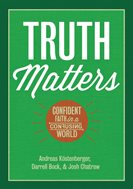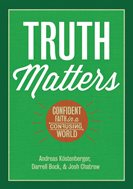Christianity makes much of truth. It insists that God’s human creatures, made in his image, deal with one another truthfully because God himself is true. Moreover, the entire superstructure of Christianity admittedly yet confidently rests on certain truth claims apart from which it would collapse. Its teachings are given us in a book that claims to come to us from God and therefore is itself true in all that it affirms. It would be difficult to overstate the importance of truth to Christianity.
And so it is just here – Christianity’s foundational truth claims – that its critics must focus their attack. We Christians love to point out that despite the sustained attempts to disprove and discredit Christianity, we are still here. And we love to insist that truth is never a threat but always our friend. And for any of us who have seen the critics come and go over time, we fully expect that each next one will only give rise to a new showing of the facts – facts which will inevitably declare yet once again that God is true.
This, very simply, is the significance of the new Truth Matters: Confident Faith in a Confusing World, by Andreas Köstenberger, Darrell Bock, and Josh Chatraw. We found it captivating, a book that addresses the leading popular attacks on Christianity in a clear, simple, and engaging way. We caught up with the authors, and Darrel Bock is their spokesman talking to us today about their work.
Books At a Glance (Fred Zaspel):
First, let’s talk context. Who is Bart Ehrman? And can you tell us something of your own interaction with him and/or the issues he raises?
Bock:
Bart Ehrman teaches classes on Early Christianity at the University of North Carolina in Chapel Hill. He has written several books on Christianity that have become New York Times best sellers. He was an evangelical who became an agnostic. Most of his writing reflects current discussions that are common in such university courses and takes a skeptical approach to many aspects of the Christina faith under the claim that these positions are where the historical evidence lies. He also wrote the most widely used Introduction of the NT for such courses in university contexts. His work reflects common views that are in the public square about Jesus and the New Testament.
 Books At a Glance:
Books At a Glance:
Your book is remarkably accessible; what audience are you addressing?
Bock:
We were aiming for High Schoolers headed to college, as well as their parents, people for whom these issues are mostly new. We hoped they might read the book together. We also wanted to model how to talk about these issues with them, so youth leaders and pastors are intended for that goal.
Books At a Glance:
Have you found that the questions raised by Bart Ehrman, or others like him, are new? Or are they old questions simply repackaged for a new audience?
Bock:
These are mostly old questions (NT manuscripts, pseudonymity, the problem of evil, canon), but some of those discussions have been updated, while others, like the defense of alternative Christianities, was not initially well received but now is more widely circulated.
 Books At a Glance:
Books At a Glance:
Are there certain characteristics you find common to most critics of Christianity and/or the criticisms they advance? In the college classroom perhaps?
Bock:
The approach is to make a point that is historical and often a correct observation about what is in the Bible, but the spin placed on what is seen and how it works is not the only or best way to see things. Other options are often left untreated, leaving an impression there is more scholarly consensus than actually exists.
Books At a Glance:
You mention in your book the false disjunction between facts and faith, that critics insist that they have “the facts” while Christians cling to “mere faith.” According to the Christian view, just how is faith related to facts?
Bock:
Well, we cannot prove everything with 100% certainty at a historical level. We can make a case for many things in the New Testament record. These are ancient events and the remains that allow for corroboration, which is a key in historical discussion, is partial. At some point we have to trust the quality of the resources we have testifying to these events or not.
Some issues are also a function of larger worldview perspectives. So Jesus is said to perform miracles. Whether he did is a worldview discussion. That worldview discussion can impact how we view the sources and what they claim. We can show these sources are generally trustworthy, so would the writers and early church tradition get something this basic to Jesus wrong in an environment where they are trying to convince people who might be skeptical? At some point, faith in the sources should kick in. Faith can lead into understanding.
Books At a Glance:
What is a good posture for a Christian to take – say, a college student – when confronted with a biblical “problem” for which he or she has no immediate solution? How does “faith seeking understanding” move forward at a point like this?
Bock:
The student should access the myriad of resources that are available to help with such issues. There are dozens of them. Our books mention these kinds of resources. Hopefully the student has access to someone trained in theology who can be of help and knows where these resources are. They can be a great help. Check out evangelical publishing houses for these resources.
Books At a Glance:
How might churches better prepare their teens for the assaults they will encounter in the university? It is difficult to cover all the questions that may arise, but at least what are the primary issues the church should address? And, thinking more broadly than just specific questions that may be raised, how might teachers and church leaders most effectively ground their people with informed confidence in the trustworthiness of Scripture?
Bock:
One has to face up to these views, get students familiar with them, and the answers to such questions. That is precisely why we wrote the book in the hopes churches and young people could talk about them together in a learning and encouraging community context. Often churches try to shield their people from such questions and issues. That is precisely the wrong way to do it. Students who are curious will find and hear about these views. It is better to engage them directly. Failure to do so leaves an impression the church will not or cannot address these questions.
